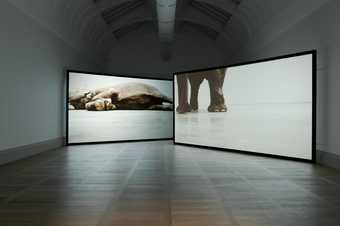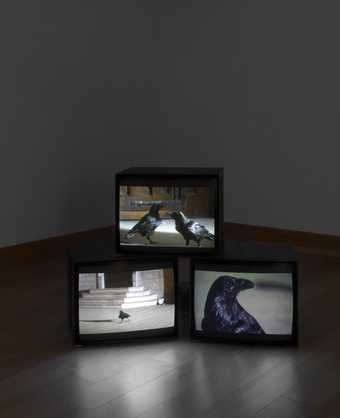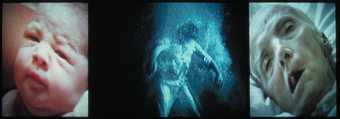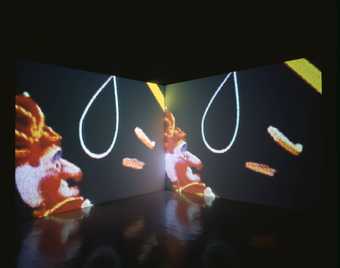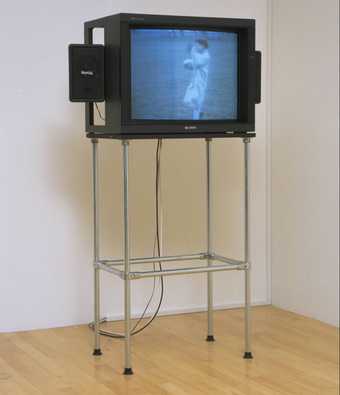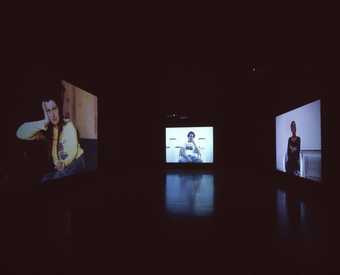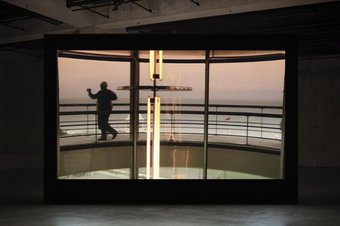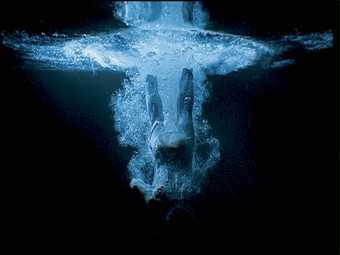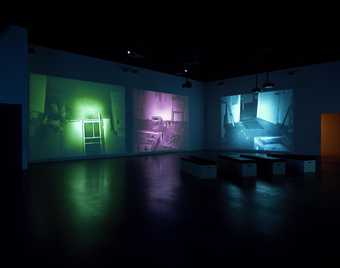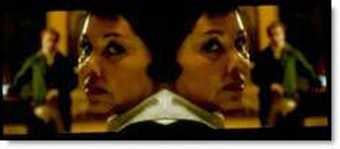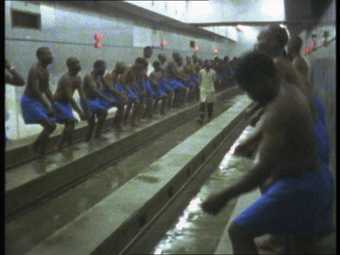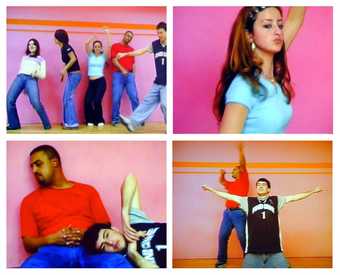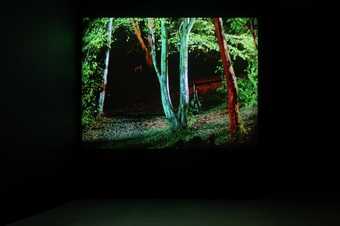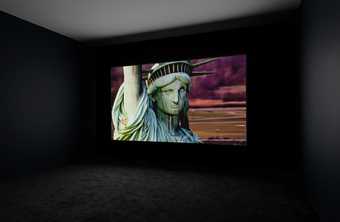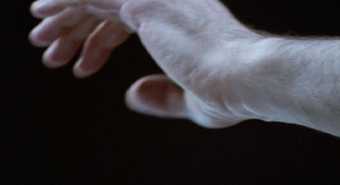Not on display
- Artist
- Jane and Louise Wilson born 1967
- Medium
- Video, 4 projections, colour and sound (mono)
- Dimensions
- Collection
- Tate
- Acquisition
- Purchased with funds provided by Edwin C. Cohen 2001
- Reference
- T07698
Summary
Gamma is a four-screen video projection which was shot in the former United States Air Force base at Greenham Common in Berkshire, England. In 1979, NATO (North Atlantic Treaty Organization) decided to station 96 cruise missiles at Greenham Common and thus prompted the establishment of the Women's Peace Camp in 1981, a non-violent, anti-nuclear mass protest which was to last for nineteen years and make regular newspaper headlines. Decommissioned in 1992, the missile base is now an eerily deserted monument to Cold War paranoia. Gamma is a companion piece to an earlier work of 1997, Stasi City, which was filmed inside the abandoned headquarters of the German Democratic Republic Intelligence Service, known as the Stasi. Both works were possible to make only because of the collapse of the Soviet Union in 1991 and the end of the Cold War.
Gamma comprises four floor-to-ceiling projections on each wall of a square-shaped room. Two sets of projections are paired, projected into opposite corners of the room and thus viewed like the pages of an open book. The camera's eye roves through the abandoned base, scanning control panels, empty missile silos, decontamination chambers and derelict offices. There is a sense that one is trespassing on forbidden territory as the viewer is allowed vicariously to stalk the corridors that for so long remained off-limits to all but military personnel. The slow, steady movement of the camera through the airbase produces an increasing sense of paranoia and surveillance. Occasional glimpses are offered of uniformed female figures, played by the Wilsons, who silently and solemnly prowl the empty spaces. The low hum of activated equipment is punctuated by sudden noises which appear to be too loud, too close, thus recalling the conventions of film noir and contributing to the escalating atmosphere of anxiety and threat. One commentator has remarked that, in Gamma, 'the gnawing absence seems to signify some kind of traumatic occurrence' (Claire Doherty, Jane and Louise Wilson, 2000, p.76). The multi-screen installation frequently juxtaposes different perspectives of the same architectural space. In a 1999 interview, the Wilsons said: 'Our primary interest is to emphasise two different viewpoints by simultaneously projecting shots on four screens or from two distinct vantage points. One shot may be very low on the ground and may be a tracking shot, one might be coming on a jib arm from above, so you would get two dramatically different perspectives. It creates an awareness of two different sets of eyes or two different ways of looking.' (Quoted in Jane and Louise Wilson, 1999, p.15) The resulting footage is then frequently subjected to kaleidoscopic repetition, adding to the Wilsons' vocabulary of disorientation which also includes the use of 'labyrinthine space, reoccurring features, mirroring, undisclosed exits and anonymous figures' (Doherty, p.76). One consequence of this strategy is that the spectator is unable to locate him or herself within a secure viewing position. Standing in the middle of the installation surrounded by the image, there is no place where the viewer can feel properly anchored and in control. These unsettling viewing conditions, coupled with a location of such paranoiac resonance, produce a work that is both disorientating and deeply affecting.
Further reading:
Jane and Louise Wilson, exhibition catalogue, Serpentine Gallery, London 1999, pp.5-15, reproduced in colour, p.29 and pp.34-5.
Jeremy Millar and Claire Doherty, Jane and Louise Wilson, London 2000, pp.74-8, reproduced pp.62-71.
Gilda Williams, 'Jane and Louise Wilson', Art Monthly, no.225, April 1999, pp.26-7.
Helen Delaney
January 2002
Does this text contain inaccurate information or language that you feel we should improve or change? We would like to hear from you.
Film and audio
Explore
- architecture(30,960)
-
- military(6,806)
-
- missile base(12)
- monuments(1,376)
-
- monument(362)
- formal qualities(12,454)
-
- photographic(4,673)
- menace(209)
- clothing and personal items(5,879)
-
- skirt(93)
- uniform / kit(324)
- woman(9,110)
- leg(337)
- Wilson, Jane(1)
- Wilson, Louise(1)
- Berkshire(746)
- England(19,202)
- England, South East(5,940)
- England, Southern(8,982)
You might like
-
Douglas Gordon Play Dead; Real Time (this way, that way, the other way)
2003 -
Douglas Gordon Looking Down With His Black, Black, Ee
2008 -
Bill Viola Nantes Triptych
1992 -
Susan Hiller An Entertainment
1990 -
Lucy Gunning The Horse Impressionists
1994 -
Sam Taylor-Johnson OBE Killing Time
1994 -
Ian Breakwell The Other Side
2002 -
Bill Viola Five Angels for the Millennium
2001 -
Sir Isaac Julien CBE RA Vagabondia
2000 -
Sir Steve McQueen Caribs’ Leap/Western Deep
2002 -
Phil Collins they shoot horses
2004 -
Adam Chodzko Nightvision
1998 -
Sir Steve McQueen Static
2009 -
Douglas Gordon Feature Film
1999


